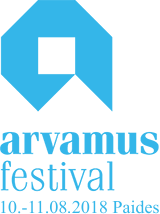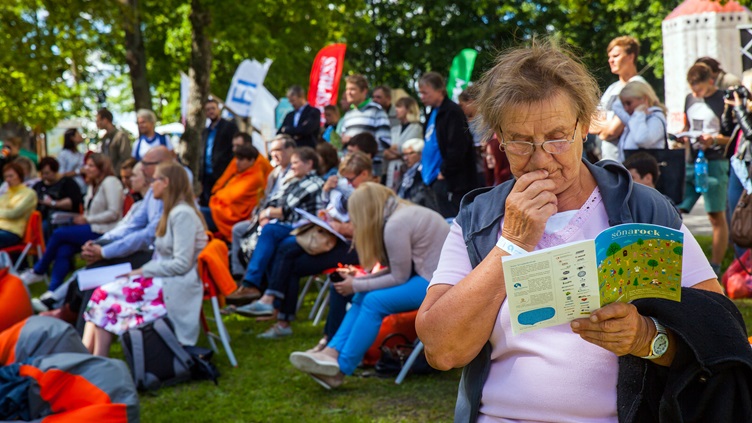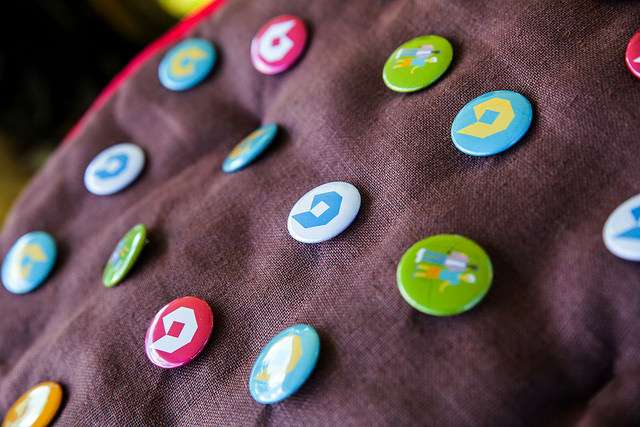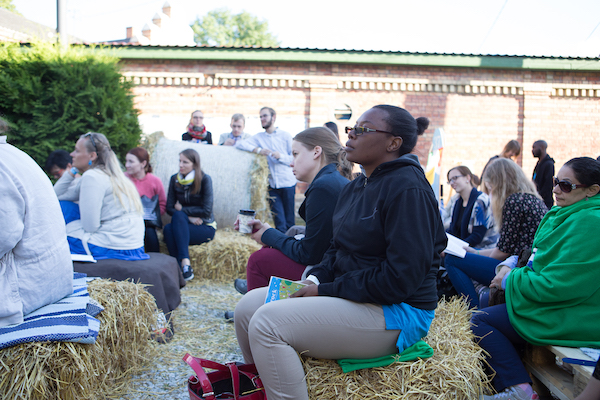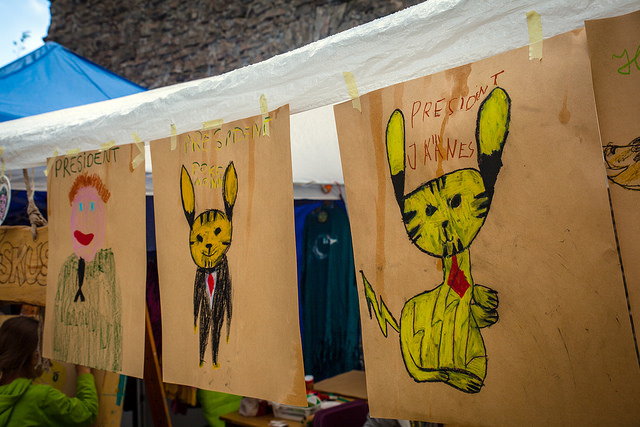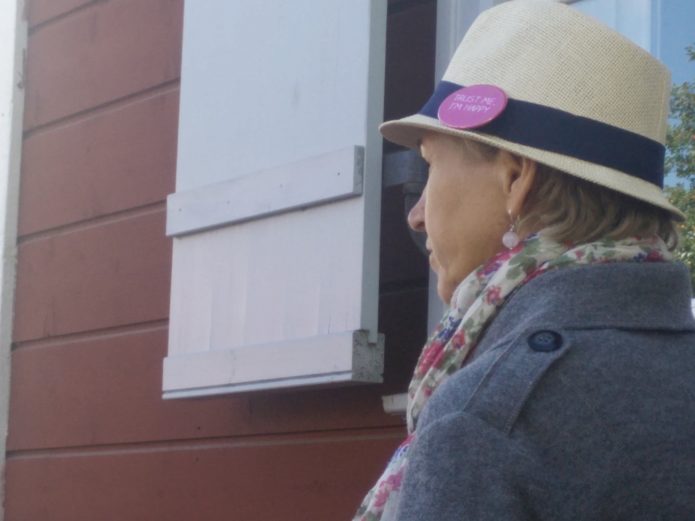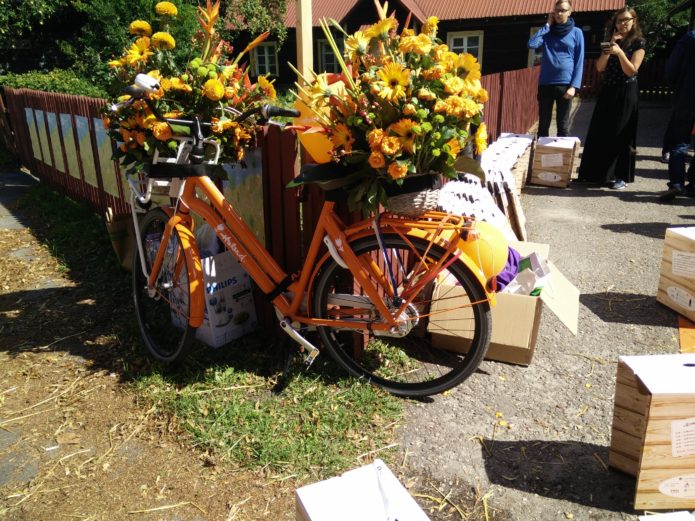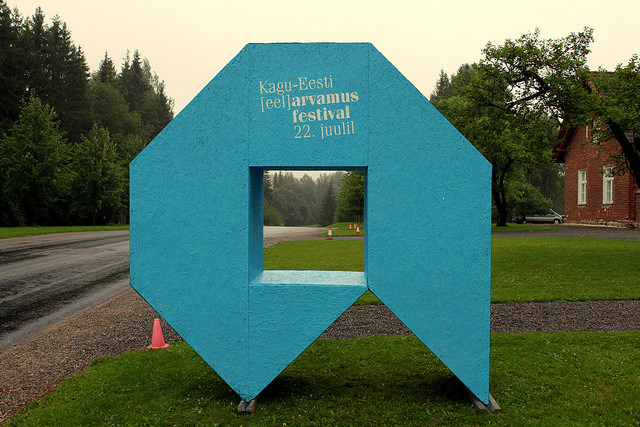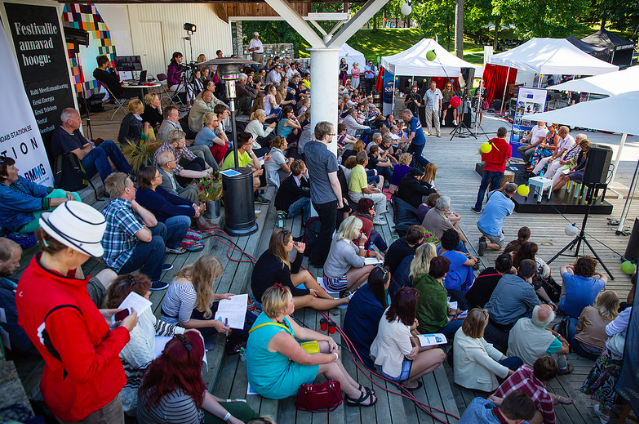In the spirit of opening up one of Estonia’s foremost civic events to people of all creeds and backgrounds, the Opinion Festival (Arvamusfestival) will this year host a raft of discussions in English.
The ten discussions and one theatre performance will be tackling a diverse range of topics, from the sustainability of Estonia’s start-up scene, to the growing popularity of veganism, to changes afoot in the European Union. Befittingly for its fifth anniversary, this marks the highest concentration of English-language discussions in the festival’s history.
While this year’s festival has consciously trimmed the number of discussions to 162 overall, English emerges as the exception here. This is not just a mere numbers’ game. The diversity of issues under discussion shows English truly cementing itself as an essential festival language, alongside Estonian and Russian, and displays a growing interest from discussion organisers to tap into the full expertise available in Estonia and nearby countries.
The discussions are dispersed across all of the festival’s six core themes — technology, labour and markets, education, the living environment, the individual, and community — but there are common threads running through all eleven English-language events.
A case in point are two discussions on Friday which attempt to offer a different outlook on Estonia’s technology sector. The first, bringing together an anthropologist with local tech scene sweethearts Taxify, Pipedrive and Mooncascade, aims to humanise User Experience (or, to use its more techie moniker, UX) and unravel the value of putting human experience at the centre of product design from the get-go, a still largely new concept in Estonian start-ups.
A separate discussion turns its back on ready-made assumptions and looks to ask honest, if uncomfortable, questions about the state of Estonia’s start-up ecosystem and whether the “yippee-rhetoric attitude” it sometimes attracts could be counterproductive to its success.
There are also a wealth of other discussions tackling market-related questions. Notably, as more and more companies in Estonia are adopting, or at least involving to some degree, English as a working language, it has never been timelier to consider diversity in the Estonian workplace and build awareness of expats and people from different cultural backgrounds already enriching Estonian society. Pushing Opinion Festival’s philosophy of inclusivity one step further, a discussion on Saturday will not have “speakers” in the traditional sense but will follow the “World Cafe” method where small groups of people move from table to table to discuss different issues related to the topic of diversity.
Other discussions on Saturday give participants the chance to delve into wider questions about social responsibility and consumer education. In this vein, development charity NGO Mondo is holding an extensive discussion on the reality of palm oil production to consider what improvements can be made to the supply chain to eliminate environmental damage and human rights violations. To keep it solutions-focused, the discussion will draw in research and practical tips from Finland and Estonia.
The experiences of Estonia’s northern neighbours will likely also feed in heavily into a discussion about veganism. While veganism has flourished in Estonia over the past few years and become the chosen diet for many, there is still social stigma attached to it and official nutritional guidelines continue to regard it as a potentially dangerous self-restricted diet — unlike Finland and Sweden where it by and large enjoys the backing of the medical community.
This is just a taste of the discussions available in English over the two days. Coinciding with Estonia’s Presidency of the Council of the European Union, it is only appropriate that other topics involve the issues shaping Europe today and which Estonia will be trying to co-ordinate at an EU-wide level during the latter part of 2017 — such as the impact of Brexit, involving speakers from England, Scotland and Northern Ireland. Likewise, a discussion on Catalan independence can cast an interesting light on the way Estonia thinks about self-determination, especially as the country’s own long-anticipated 100th anniversary in February 2018 draws near.
The Opinion Festival is also constantly evolving and responding to its participants — who, given that the festival is free and open to all, could be anyone from Estonia and beyond. It is hardly surprising that in its fifth year, the festival should include a self-reflexive discussion about the role and impact of democracy festivals, born in collaboration with other similar events in the Nordic and Baltic region.
If we were to see the Opinion Festival as both reflecting and catalysing the state of democratic debate in Estonia, the boom in English-language discussions should be seen part and parcel of Estonia becoming at once more outward-facing and not afraid to open up its inward-facing reflections to a wider audience.
The full programme is available here.
All English-language discussions at the Opinion Festival
Friday, 11th August
14:00-15:30
Humanizing IT – UX for the future
Discoveries area (Avastuste ala)
User experience (UX) design has been declared to be one of the keys in order to succeed in innovation. However, in Estonia it is still a rather new course. In the discussion we would like to find answers to questions such as what is the purpose of participatory design and how to find out as quickly as possible what one’s target group really needs and wants. We are bringing programmers, designers and anthropologists together to collaborate and find out the best ways to create something new and useful. This enables the ICT specialists and designers to figure out the niche of their products. At the same time anthropologists and other people from social and human sciences can rediscover the potential of using their skills in the job market on somewhat surprising fields like ICT and design.
Moderator: Ede Schank Tamkivi (NGO Eesti 2.0 CEO)
Participants: Jaanus Kase (Pipedrive, Head of Product Design) Markus Villig (Taxify, CEO) Genia Trofimova (Mooncascade, Product and Project Manager) Keiu Telve (Center for Applied Anthropology of Estonia, anthropologist)
Organiser: Center for Applied Anthropology of Estonia
Category: Technology
16.00-17.30
Unlocking the new economic development – the prospect of bioeconomy
Discoveries area (Avastuste ala)
Why countries and companies invest increasingly in bioeconomy? Because this is the next economic wave. Bioeconomy shall also mitigate the climate change and environmental impact and make sustainable use of natural resources. This is the only way to do business today! The bioeconomy means the smart, circular use of renewable natural resources for food, feed, bio-products and energy. During the debate we shall look into how the bioeconomy reconciles environment and economy and bolster rural employment. We investigate the new bioeconomy business model and describe what is in it for everybody. We have invited Nordic entrepreneurs to share their experiences about opportunities and challenges of bioeconomy. Estonian panelists contemplate on how Estonia could step up the developments towards bioeconomy – what will this demand of society, communities and the government? Come along, listen in and have your say on how to do business in the future, where current trends are pointing us and why certain countries are dedicated to promoting the bioeconomy.
Moderator: Madis Tilga (Nordic Council of Ministers)
Participants: Stefan Sundman (Vice-President, UPM Biofore), Tanja Häyrynen (Project manager, Arctic Bioeconomy), Toomas Kevvai (Vice-chancellor of Estonian Ministry of Rural Affairs), Kristjan Piirimäe (sustainability expert)
Organiser: Nordic Concil of Ministers’ Office in Estonia
16.00-17.30
Self-determination of nations in the European Union: Case of Catalonia
Estonian Free Party area (Eesti Vabaerakonna ala)
Self-determination of nations in today’s European Union. The Catalans wish to hold a referendum to determine the opinion of their people about independence. So far, Spain has avoided the issue, and the official position has been not favourable. How the Spaniards and the Catalans themselves see it. This program and debate is organised in cooperation with the Public Diplomacy Council of Catalonia.
Moderator: Artur Talvik
Participants: Mr. Jaume Clotet Planas, Communications Manager at the Government of Catalonia and Mr. Rafael Arenas, law professor and former President of anti-Catalan Independence organization “Societat Civil Catalana”
Organiser: Estonian Free Party
Category: Living environment
18:00-19:30
Let’s get real about start-ups: Signal vs. Noise
Inclusive Society area (Kaasava ühiskonna ala)
Estonia produces the biggest number of startups and seed stage investments per capita than any other country in Europe. Estonian startup ecosystem is packed with business plan competitions, pitching workshops, hubs, conferences and events and the confidence of young Estonian entrepreneurs is backed up by start-up accelerators and venture capitalists in London and Silicon Valley. At the same time there are questions about their success-stories and criticism towards the yippee-rhetoric attitude. Is this a confrontation between the new and the old economy or is it something else? We are exchanging thoughts and debate the issue to better understand what’s behind the criticism.
Moderator: Jüri Muttika
Participants: Martin Henk (Co-Founder at Pipedrive), Gleb Maltsev (Co-Founder at Fundwise)
Organiser: Pipedrive
Category: Technology
18.00-19.30
What will the future of Great Britain and the EU be like after Brexit?
Estonian Free Party area (Eesti Vabaerakonna ala)
Brexit and its impact on Europe, Great Britain and Estonia. Estonia has just assumed the Presidency of the EU Council, and this topic is a daily relevant issue also during our Presidency. What can we and the European Union learn from it, and what do the people from different parts of Great Britain think of it.
Moderator: Andres Herkel
Participants: Representatives of Scotland, Northern Ireland and Britain
Organiser: Estonian Free Party
Category: Living environment
18.00-19.30
The power of democracy festivals
Participatory democracy area (Osalusdemokraatia ala)
In 1968 Olof Palme, Sweden’s minister of education at the time, held a speech, standing in the back of a flatbed truck. The truck was parked by Almedalen park and a couple of hundred people gathered to listen to what he had to say. 50 years later, democracy festivals throughout the Nordic region have gone viral. Why is that? Is it because we’ve noticed lately how fragile democracy actually is? We invite you to have a conversation with us over what has been the societal impact of democracy festivals in our region and why do we need them.
Moderator: Liis Kängsepp (The Opinion Festival’s coordinator of international cooperation)
Participants: Mari Haavisto (SuomiAreena organiser), Ieva Morica (LAMPA organiser), Mads Randbøll Wolff (independent senior adviser at Spark)
Organiser: The Opinion Festival
Category: Community
Saturday, 12th August
11:30-13:00
Diversity in the Estonian workplace and society: The good, the bad and the ugly
Education area (Hariduse ala)
The aim of this discussion is to increase the awareness towards foreigners and people from different cultural backgrounds working and living in Estonia as an already existing part of society. We wish to encourage a lively discussion where we exchange views on the benefits and challenges of cultural diversity at the workplace and what it means to society in broader terms, hopefully resulting in new ideas and proposals for the discussed issues. All this with the help of a diverse audience.
Moderator: Cornelia Godfrey (Austrian Embassy)
Participants: Instead of a panel, we opted to have a lively and constructive discussion in small groups, based on the World Café method. We hope to hear the views, concerns and proposals that the audience has about the different questions and topics, with Dennis Kristensen (Sindi Lanka, Danspin) making a brief introduction.
Organisers: Enterprise Estonia, Estonian Ministry of Culture
Category: Labour and markets
13.00-14.30
Veganism: a self-restricted or a healthy diet?
Health area (Tervise ala)
Veganism is growing in popularity both globally and in Estonia but opinions about the healthfulness of vegan diets vary to the extreme between specialists and countries. Overseas in Finland and Sweden, veganism in considered appropriate throughout all stages of life and the national nutritional guidelines give advice on balanced nutrition for vegans. Estonian nutritional guidelines, on the other hand, regard veganism as a self-restricted diet that will lead to long-term health complications. What does the science tell? Should vegans be supported and how?
Moderator: Marta Velgan (Estonian Junior Doctors’ Association)
Participants: David Stenhholtz (oncologist at Stockholm’s Södersjukhuset hospital), Mikael Fogelholm (Professor of Nutrition at Helsinki University), Ülle Einberg (president of the Estonian Association of Paediatricians), Karmen Joller (general practitioner)
Organiser: Eesti Vegan Selts (Estonian Vegan Society); sponsored by Swedish Institute and the National Foundation of Civil Society
Category: The individual
14:00-15:30
The pain and glory of PhD degree: do you and the society need it?
Science area (Teadusala)
The movement March For Science started in 2017 indicates that science aims for more impact in society. Is the role of PhD degree also changing? What are the risks and gains of PhD degree in Estonia? These questions will be discussed with the professionals representing different views. We will inform the audience about PhD studies, possible carrier choices and the current drawbacks of science funding system aiming. We aim to come up with the new ideas improving perspectives of the doctorates.
Moderator: Dr Martin Aher
Participants: Prof. Andres Taklaja (CEO of OÜ Rantelon, private sector member), Prof. Anne Kahru (professor at National Institute of Chemical Physics and Biophysics – independent research institute), Prof. Erkki Truve (former vice-rector of Tallinn University of Technology), Dr. Ulla Preeden (Rector of Tartu Health Care College and politician)
Organiser: National Institute of Chemical Physics and Biophysics
Category: Education
14:45-16:15
Under the palm tree
Inclusive Society area (Kaasava ühiskonna ala)
Under the palm tree” Palm oil is one of the most used and consumed vegetable oils that is found in approximately 40-50% of household products and fuel in many developed countries including Estonia. Palm oil can be present in a wide variety of products, including baked goods, confectionery, shampoo, cosmetics, cleaning agents, washing detergents and toothpaste. The truth, however, is that palm oil industry is linked to issues such as deforestation, habitat degradation, climate change, animal cruelty and indigenous rights abuses in the countries where it is produced. Let’s talk about the real life under the palm tree but also let’s look at the solutions: how can we make good palm oil? How can we produce, supply and consume without damaging the environment and abusing people’s rights? What is the role of the producers? What can Estonian supermarkets do? With the stories, facts, research and practices from Finland and Estonia, we will engage the participants to think about their choices and consumption patterns to reduce poverty and contribute to economic sustainability also for the farmers and producers in the Global South. The discussion takes place within a pan-European project “Supply Cha!nge. Let’s Make Supermarkets Fair” that is funded by the European Commission and the Republic of Estonian Ministry of Foreign Affairs development and humanitarian aid resources. The contents of the discussion are the sole responsibility of NGO Mondo and can under no circumstances be regarded as reflecting the position of the European Union.
Moderator: Kristina Mänd (NGO Mondo)
Participants: Anu Kultalahti (researcher in the Finnish NGO Finnwatch), Märt Miljan (co-founder of Estonian cosmetics producer Lumi) and Kaire Roosi (Meal Category Group Manager from Rimi supermarket chain)
Organiser: NGO Mondo
Category: Category: Living environment
18.00-19.30
Youth Democracy Theatre
Participatory Democracy area (Osalusdemokraatia ala)
In cooperation with NGO Forum Theatre in Estonia, the Danish documentary theatre C:NTACT and NGO Palidzesim from Latvia the Danish Cultural Institute in EST, LV and LT presents a youth theatre production on democracy at Opinion Festival 2017.
The performance engages youngsters from Estonia, Latvia and Denmark in a joint performance with a point of departure in the young people’s experiences of democracy in everyday life and the society they wish for in their future. Enjoy the performance and take part in the discussion afterwards: How does YOUR democratic society look like and where do YOU take part?
Moderator: Didzis Jonovs
Participants: Youngsters from Estonia, Latvia and Denmark
Organiser: The Danish Cultural Institute in Estonia, Latvia and Lithuania
